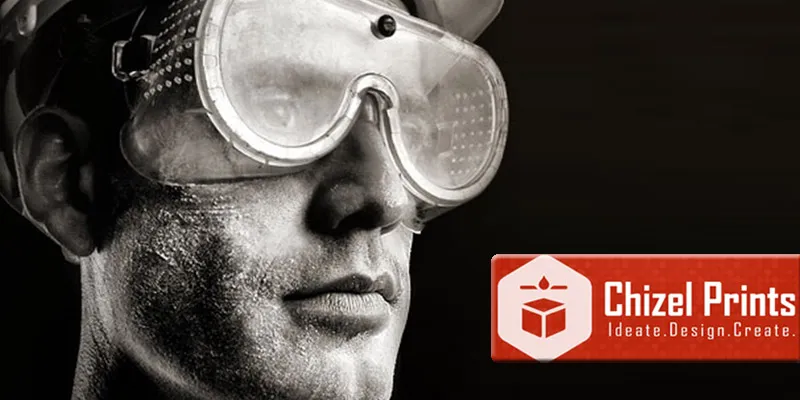Pune-based Chizel wows architects and builders with 3D printed ‘smart models’
Many of us have already seen videos of the first chocolate printer. We watched in fascination as layers of chocolate were painstakingly added one after the other to create a beautiful, customised piece. We marvelled at the extreme precision and level of detailing- features that could only be created by a highly skilled chocolatier.

The appeal of 3D printing lies in the execution of the little details and complexities. Designs deemed too complicated can now be brought to life one layer at a time. As the demand for customisation increases, this technology is only becoming more affordable, with even a model on Kickstarter selling at $100.
Chizel Prints, a Pune-based venture has taken 3D printing mainstream by applying its technology in architecture, real estate and marketing. It delivers miniature, scaled down 3D printed models of residential buildings, apartment complexes, shopping malls, bungalows, row-houses, townships, institutional complex, resorts, industrial models, interior design models, commercial and hospitality structures, both single and multi-coloured, all equipped with superior automation, wireless integration application and electronics.
Foraying into the unknown

Yash Rane and Akash Behl were first exposed to the finer nuances of 3D printing while building robots together at IIT, Roorkee. Using a 3D printer helped them develop the body of their robot with unparalleled precision. Although both followed rather conventional routes after completing mechanical engineering,Akash worked as a CAE consultant in South Korea and Yash joined Behr, an automotive company in Pune.Neither of them could ignore the potential impact 3D printing could have in sectors that relied heavily on design and precision, yet remained untouched by technology.
It took 3 months and a number of conversations with individuals from various fields for the pair to zero in on a brilliant growth opportunity– architecture, a sector that continued to use hand-crafted models of buildings that were relatively less realistic in terms of looks and measurements.
What you see is what you get
Chizel has wowed architects and builders alike with ‘smart models’ – tech-friendly, wireless integration enabled, scaled down replicas of buildings such as the Nanded City project by one of Pune’s topmost real estate companies, Magarpatta Township & Developers. Its offering ups the ante significantly when it comes to creating architectural models. Each smart model is manufactured in sandstone (a material that is literally closer to the ground, making the model look much more realistic than plastic-based handmade models), fitted with mobile cars, lifts, etc. Embedded with electronics, the lighting and structures of the model can be controlled by the client using a mobile application, thus increasing the user interaction. The application also includes floor-wise costing parameters, means to record and analyse customer behaviour and general information.
The inclusion of a 3D printer in the process of constructing a model has helped Chizel reduce the project lead time by nearly 50 per cent. A model that would take an artist a month to develop can be constructed by Chizel in two weeks. Detailed implements such as chandeliers are difficult to create manually; however, 3D printing has no such limitation. As far as the dimensions go, smart models can achieve close to 0.025 mm accuracy, so prospective clients are not misled by design features that may not translate to an exact replica on site.
Chizel’s technology-integrating approach also brings in certain intangible benefits to the entire industry. With a dedicated design team that can convert drawings into appropriate design files coupled with the suitable 3D printing methodology, Chizel offers a high level of professionalism and enhanced user experience with their services. Architects and designers will no longer have to handhold their employees through the model-making process. Once the design is submitted to Chizel, the process of turning a design into a scaled, high-grade model requires minimal intervention from the client. Prospective buyers are immediately engaged by the realistic appearance and innovative features of the model, making marketing much easier for the architects and builders. In the last four months, Chizel has seen sales of close to INR 36 lakhs and received a majority of their projects through positive referrals from existing clients.
The team’s success has helped catalyse their involvement in other sectors like chemical technology and shop floor performance monitoring (a snapshot of Chizel’s customers is given below).

Capturing the rest of the world
Chizel’s founders have big plans for their venture. They hope to position Chizel as a one-stop shop for reverse engineering and rapid prototyping, and recruit a bigger back-end team to support the growing demand for their services. Offices at Delhi and Singapore are on the cards, since the team is optimistic about gaining a foothold in the South East Asian market. In two to threeyears, Chizel aims to build internal capacities and offer their services to the indisputable hub of architectural innovation – the Middle East. The co-founders are also keenly looking at the entertainment sector as a possible avenue for business growth, including film set construction and prop design.
In a country dominated by cheap, abundant labour, will it be difficult for potential clients to get used to the concept of 3D printing? Akash signs off mentioning: “It takes some time to convince the builders and architects about the technology. But all they have to do is take a look at our models; they speak for themselves.”







